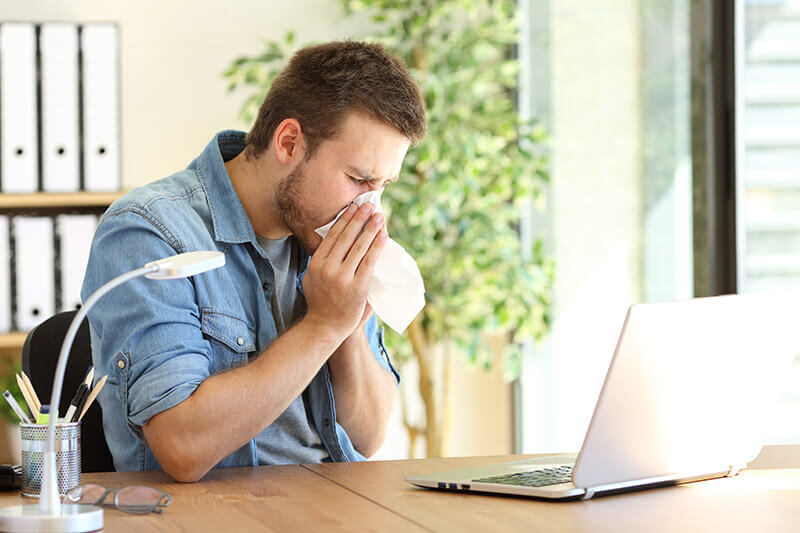Air Conditioning and Allergies: What You Need to Know
April 8th, 2021 by cverdone

Allergies affect more than 50 million Americans. Allergens or triggers cause these issues. These include sneezing, watery eyes, and other common allergy symptoms. Did you know your air conditioner can also play a role in the number of allergens in your home?
It’s Not Your AC, It’s the Allergens
You’re not allergic to your air conditioner. If you notice allergy symptoms in your home, it could be from something else. Your air conditioner and the ductwork can spread allergens in your home. Air conditioners can also spread bacteria and viruses. These combine with allergens to make you feel sick.
Air contamination means high levels of allergens and microorganisms. This can cause any of the following symptoms or issues.
- Sneezing and coughing
- Fatigue
- Fever
- Dizziness
- Digestive issues
- Respiratory issues
Allergens That Can Spread With Help From Your Air Conditioning System
Your air conditioner can spread allergens that may be in your home. It can also spread allergens that come into your home. This happens is you have dirty or clogged filters. Pet dander, pollen, dust, and mold are some irritants that can cause issues. These can spread around your home with help from your air conditioner. The more they spread, the sicker you can become.
Reduce Allergens in Your Home
You’re not going to be able to keep all allergens out of your home. Take some steps to help your air conditioner cut down on airborne allergens. An HVAC professional from Thornton Heating Service, Inc. can help you with the following steps.
-
Check and change your air conditioner filters.
-
Clean air conditioner registers and vents to remove dust and other possible allergens.
-
Clean the ductwork your air conditioner uses.
-
Attach a dehumidifier to your air conditioner to control humidity in your home.
Consider a HEPA Air Conditioning Filter
Air conditioner filters can also help when you use HEPA filters. These filters are much better at removing allergens and contaminants. HEPA filters are often recommended. They remove approximately 99% of airborne particles.
Don’t Forget about Your Outside Air Conditioning Unit
Allergens can also get into your home through your outside air conditioning unit. This can happen if your exterior unit has a lot of debris around it. Flowers, plants, and trees produce allergens. If they’re around your outside unit, it can also give allergens a way into your home via your AC unit.
Rare Skin Reactions
Allergens aren’t the only possible cause of allergy issues involving air conditioning. In some instances, people can react to the cold air from a cooling system. This happens when it comes into contact with their skin. This is a rare condition known as cold urticaria. It’s an allergic reaction to very cold air. Protect exposed skin and be mindful of air conditioning settings. This can help with this issue.
Call Our HVAC Professionals Today
You’ll want to talk to your doctor about allergens and your allergy issues. An HVAC professional from Thornton Heating Services, Inc. can make sure your air conditioning system is clean and operating. Our HVAC professionals can also check your ducts and other sources of allergens.
Call us today to speak to our HVAC professionals about air conditioning maintenance.

